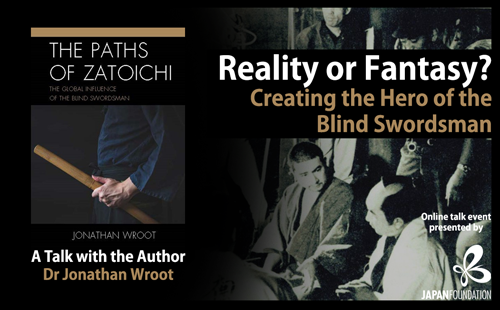
Reality or Fantasy? Creating the Hero of the Blind Swordsman
- 5 May 2022
- 7.00pm (BST)
- Online
- https://www.jpf.org.uk/whatson.php#1217
- 020 7492 6570
- info@jpf.org.uk
- Tweet
Zatoichi is regarded as one of the most influential characters from Japanese jidai-geki (period films). The first film out of 29 Japanese titles was directed by MISUMI Kenji and released in 1962. The series gained so much popularity that it was later remade in the USA. Despite being blind, Zatoichi is an accomplished sword fighter who beats many villains, and is inspiring enough to capture the hearts of even contemporary film makers such as KITANO Takeshi and MIIKE Takashi. Although adapted from literature and supposedly modelled on a real person, the film’s version of the character is far from the original influences. It was certainly the popularity of the films that pushed Zatoichi into the limelight. How was this blind hero invented and what factored into his success?
Celebrating the 60th anniversary of the first film of Zatoichi, in this online talk Dr Jonathan Wroot, who published The Paths of Zatoichi, will introduce his latest book explaining the process of the characterisation of the famous blind swordsman, while referring to his impact on history and the cultural context. Together with Dr Dolores Martinez and Dr Jasper Sharp, the talk will also explore the representation of Zatoichi as a hero who is blind and why such a character is frequently portrayed within jidai-geki films and TV shows; while also considering the other examples of blind people in Japanese film and culture.
Speakers
Dr Jonathan Wroot is Senior Lecturer and Programme Leader for Film Studies at the University of Greenwich. He has previously published research on home media formats and Asian cinema distribution. He co-edited a collection entitled New Blood: Framing 21st Century Horror, for UWP, in 2021, in addition to his monograph on the Zatoichi film and TV franchise. Some of this research will be appearing in the forthcoming edited collection, Women in East Asian Cinema. He has contributed to the podcast series Beyond Japan and Second Features, as well as the Japan Foundation Touring Film Programme 2022.
Dolores P. Martinez is Emeritus Reader in Anthropology at SOAS, University of London and a Research Affiliate at ISCA, University of Oxford. She has written on maritime anthropology, tourism, religion, gender, film, and popular culture in Japan, as well as on women’s football in the USA, documentaries, and humour in science fiction films. Her publications include Identity and Ritual in a Japanese Diving Village; Remaking Kurosawa; editor of The Worlds of Japanese Popular Culture; and co-editor, Assembling Japan and Persistently Postwar.
Dr Jasper Sharp is an author, filmmaker and curator known for his work on Japanese cinema and the co-founder of the film website Midnight Eye. His books include The Midnight Eye Guide to New Japanese Film (2004), joint-written with Tom Mes, Behind the Pink Curtain (2008) and The Historical Dictionary of Japanese Cinema (2011). His work has appeared in publications including Sight & Sound, The Guardian, The Japan Times, and Film International, and on numerous home video releases. Between 2010 and 2014 he was the director of Zipangu Fest, a London-based festival dedicated to showcasing Japanese independent cinema, and was the Artistic Director of the Asia House Film Festival between 2014 and 2016. He is the co-director with Tim Grabham of The Creeping Garden (2014), an award-winning documentary about plasmodial slime moulds, and currently works as a disc producer for Arrow Films.
This online event is free to attend but places are limited and registration is essential. To reserve your space, please book your ticket here.
